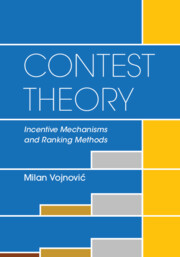Book contents
- Frontmatter
- Contents
- Preface
- 1 Introduction and Preview
- 2 Standard All-Pay Contest
- 3 Rank-Order Allocation of Prizes
- 4 Smooth Allocation of Prizes
- 5 Simultaneous Contests
- 6 Utility Sharing and Welfare
- 7 Sequential Contests
- 8 Tournaments
- 9 Rating Systems
- 10 Ranking Methods
- 11 Appendix
- References
- Index to Notations
- Index
7 - Sequential Contests
Published online by Cambridge University Press: 05 January 2016
- Frontmatter
- Contents
- Preface
- 1 Introduction and Preview
- 2 Standard All-Pay Contest
- 3 Rank-Order Allocation of Prizes
- 4 Smooth Allocation of Prizes
- 5 Simultaneous Contests
- 6 Utility Sharing and Welfare
- 7 Sequential Contests
- 8 Tournaments
- 9 Rating Systems
- 10 Ranking Methods
- 11 Appendix
- References
- Index to Notations
- Index
Summary
In this chapter we consider contests among two or more players that proceed through multiple rounds and end either in a fixed number of rounds or as soon as a termination criteria is fulfilled; for example, as soon one of the players achieves a given point difference or the contest owner acquires a given quality of the production output. The players are awarded according to a prize allocation mechanism that is based on their effort investments. We shall consider prize allocation mechanisms that either award a prize at the end of the contest or some amount of that prize at the end of each round of the contest. We shall consider contests under different assumptions on the structure of the effort investments over rounds, including those in which each player invests effort in one round according to a given order of play or strategic decisions by the players, and contests in which each player can invest effort in each round having observed the efforts invested in earlier rounds. Sequential moves may either be imposed by the contest design, may endogenously arise as a strategic equilibrium, or may occur because players “psyche themselves up” in a contest. We shall consider such models of contests formulated as extensive form games and study the properties of subgame perfect Nash equilibria. These games differ with respect to the information available to the players about the abilities of other players; we shall consider both games with complete and incomplete information.
There are many contests in practice that are based on sequential effort investments. Traditional examples include R&D patent races in which individual firms compete in filing a larger number of patents than other firms, advertising campaigns in which firms try to maintain or increase their market shares at the expense of other firms through promotional competitions, political races in which candidates confront each other in a sequence of speeches, court trials in which it is customary for the plaintiff to present evidence prior to the defense lawyers and both sides make their final speeches in the same sequential order, and sport competitions such as team sports, gymnastic tournaments, and tennis matches. There are also numerous examples of sequential contests in the context of online services.
- Type
- Chapter
- Information
- Contest TheoryIncentive Mechanisms and Ranking Methods, pp. 359 - 442Publisher: Cambridge University PressPrint publication year: 2016



